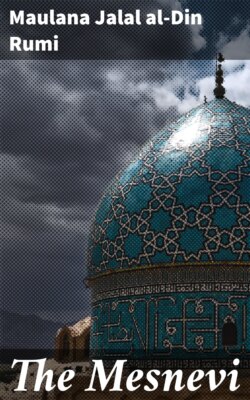Читать книгу The Mesnevi - Maulana Jalal al-Din Rumi - Страница 8
На сайте Литреса книга снята с продажи.
2.
ОглавлениеIn A.H. 605 (A.D. 1208) he, Bahā’u-’d-Dīn Veled, began to preach against the innovations of the king and sundry of his courtiers, declaiming against the philosophers and rationalists, while he pressed all his hearers to study and practise the precepts of Islām. Those courtiers maligned him with the king, calling him an intriguer who had designs on the throne. The king sent and made him an offer of the sovereignty, promising to retire elsewhere himself. Bahā answered that he had no concern with earthly greatness, being a poor recluse; and that he would willingly leave the country, so as to remove from the king’s mind all misgivings on his score.
He accordingly quitted Balkh, with a suite of about forty souls, after delivering a public address in the great mosque before the king and people. In this address he foretold the advent of the Moguls to overturn the kingdom, possess the country, destroy Balkh, and drive out the king, who would then flee to the Roman land, and there at length be killed.
So he left Balkh, as the prophet (Muhammed) had fled from Mekka to Medīna. His son Jelālu-’d-Dīn was then five, and the elder brother, ‘Alā’u-’d-Dīn, seven years old.
The people everywhere on his road, hearing of his approach or forewarned in dreams of his coming, flocked to meet him and do him honour. Thus he drew near to Bagdād. Here he was met by the great Sheykh Shahābu-’d-Dīn, ‘Umer, Suherverdī, the most eminent man of the place, deputed by the Caliph Musta’zim to do him honour. He became the guest of the Sheykh.
The Caliph sent him a present of three thousand sequins, but he declined the gift as being money unlawfully acquired. He also refused to visit the Caliph; but consented to preach in the great mosque after the noon service of worship on the following Friday, the Caliph being present. In his discourse he reproached the Caliph to his face with his evil course of life, and warned him of his approaching slaughter by the Moguls with great cruelty and ignominy. The Caliph again sent him rich presents in money, horses, and valuables, but he refused to accept them.
Before Bahā’u-’d-Dīn quitted Bagdād, intelligence was received there of the siege of Balkh, of its capture, and of its entire destruction, with its twelve thousand mosques, by the Mogul army of five hundred thousand men commanded by Jengīz in person (in A.H. 608, A.D. 1211). Fourteen thousand copies of the Qur’ān were destroyed, fifteen thousand students and professors of the law were slain, and two hundred thousand adult male inhabitants led out and shot to death with arrows.
Bahā’u-’d-Dīn went from Bagdād to Mekka,7 performed the greater pilgrimage there, proceeding thence to Damascus, and next to Malatia (Melitene, on the Upper Euphrates), where, in A.H. 614 (A.D. 1217), he heard of the death of Jengīz. The Seljūqī Sultan, ‘Alā’u-’d-Dīn Keyqubād, was then sovereign of the land of Rome (Rūm, i.e., Asia Minor), and was residing at Sīwās (Sebaste). In A.H. 620 (A.D. 1223) Sultan Jelālu-’d-Dīn, the dispossessed monarch of Kh’ārezm (Chorasmia) was killed in a battle fought by him in Azerbāyjān (Atropatene) against the Sultans of Rome, Syria, and Egypt, when his forces were totally defeated. And thus ended that great dynasty, after ruling about a hundred and forty years.
Bahā’u-’d-Dīn went from Malatia and remained four years near Erzinjān (the ancient Aziris, on the Western Euphrates), in Armenia, at a college built for him by a saintly lady, ‘Ismet Khātūn. She was the wife of the local sovereign, Melik Fakhru-’d-Dīn. She and her husband both died, and then Bahā’u-’d-Dīn passed on to Larenda (in Cataonia), in Asia Minor, and remained there about seven years at the head of a college, the princess Melika’i-Jihān, his mother, being still with him.
Here it was that his younger son, Jelālu-’d-Dīn Muhammed, the future author of the Mesnevī, attained to man’s estate, being then eighteen years old; when, in A.H. 623 (A.D. 1226), he married a young lady named Gevher Khātūn, daughter of the Lala Sherefu-’d-Dīn, of Samarqand. She gave birth in due course to Jelāl’s eldest son, ‘Alā’u-’d-Dīn.
The king had now returned to his capital, Qonya (the ancient Iconium). Hearing of Bahā’u-’d-Dīn’s great learning and sanctity, the king sent and invited him to the capital, where he installed him in a college, and soon professed himself a disciple. Many miracles are related as having been worked at Qonya by Bahā’u-’d-Dīn, who at length died there on Friday, the 18th of Rebī’u-’l-ākhir, A.H. 628 (February A.D. 1231). The Sultan erected a marble mausoleum over his tomb, on which this date is recorded. Many miracles continued to occur at this sanctuary. The Sultan died also a few years later, in A.H. 634 (A.D. 1236).
(After the death of Bahā’u-’d-Dīn Veled, and the acquisition of still greater fame by his son Jelālu-’d-Dīn, who received the honorific title of Khudāvendgār—Lord—the father was distinguished from the son, among the disciples, by the customary title of Mevlānā Buzurg—the Greater or Elder Master. The traditions collected by Eflākī, relating to this period, vary considerably from one another on minor points of date and order of succession, though the main facts come out sufficiently clear.)
